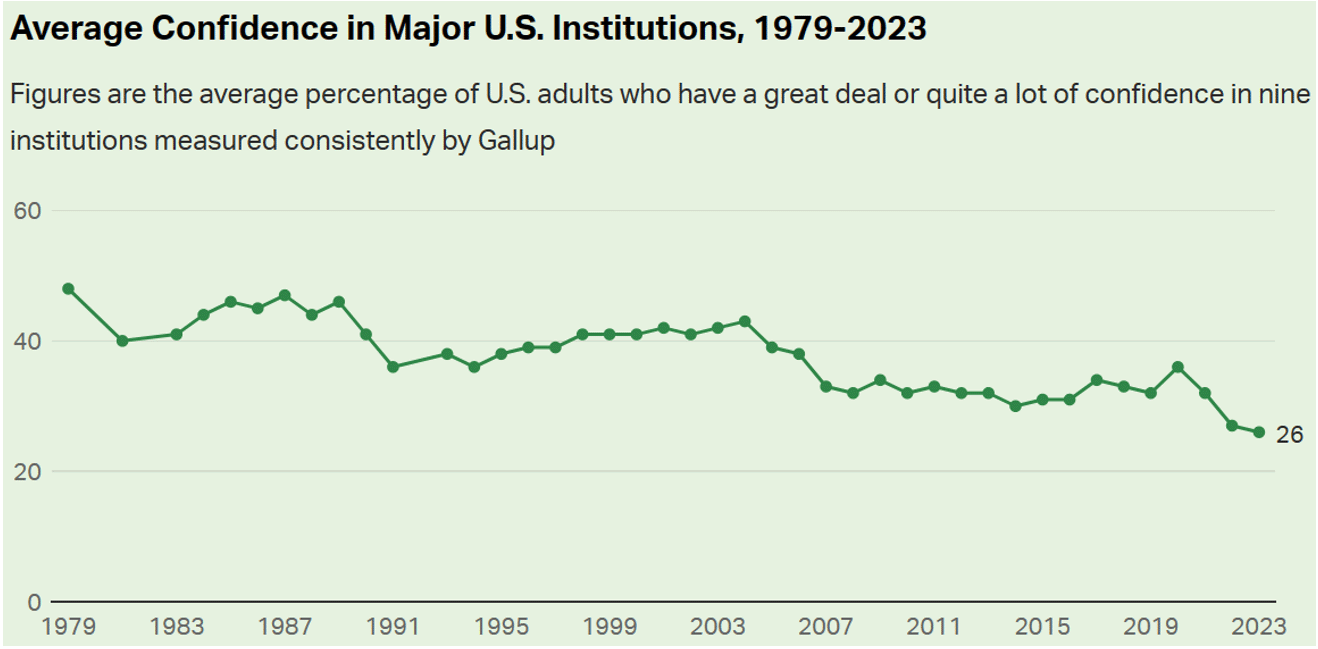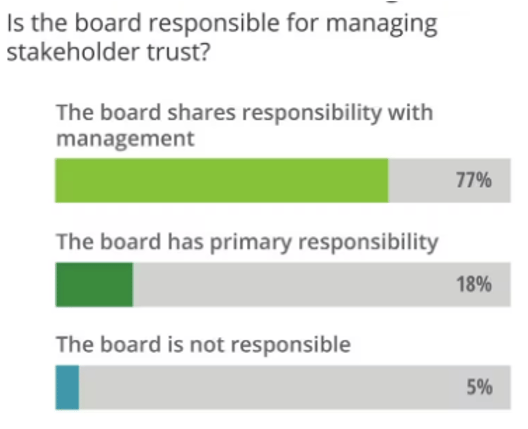
A Gallup survey in June 2023 showed continuation of a long-term trend of “historically low faith” in U.S. institutions, with many of them “at or near rock bottom.”
Confidence in big business came in at 14%, tying the annual poll’s all-time low a year earlier. Banks, whose dependence on trust – and the high cost of losing it – was painfully demonstrated in the regional banking failures of March 2023, had a confidence score of 26%. That was better than newspapers (18%), the criminal justice system (17%), television news (14%) and Congress (8%), but only five percentage points above banks’ all-time low in 2012.

Average confidence tracked by Gallup reflects the scores of church/organized religion, the military, the Supreme Court, banks, public schools, newspapers, Congress, organized labor and big business.
The investment world has taken hits, with BlackRock and Vanguard having to react to criticisms – and face fund outflows – over their allegedly “woke” environmental, social and governance (ESG) initiatives. BlackRock Chairman and Chief Executive Officer Larry Fink was said to have scrapped the ESG term because it became “too politicized.”
The trust gap is one more contributor to an amalgam of tumultuous forces – geopolitical conflicts, political polarization and economic fragmentation, climate change and natural catastrophes, cybersecurity and AI risks. JPMorgan Chase & Co. Chairman and CEO Jamie Dimon commented, with his third-quarter 2023 earnings release, “This may be the most dangerous time the world has seen in decades.” Then, and again in January, Dimon stressed the success factor of being “one of the most trusted financial institutions in the world.”
Recognizing the stakes, the World Economic Forum adopted “Rebuilding Trust” as the theme of its 2024 Annual Meeting in Davos, Switzerland. Harvard Business Review titled a special issue, published in November, “How to Build Trust.”
Calling for Action
“We see trust being a top-of-mind issue for executives across industries,” maintained Michael Bondar, principal and enterprise trust leader, Deloitte Risk & Financial Advisory. “Boards are becoming increasingly interested in this topic and asking for further action to be taken.”
In a February 2023 Deloitte Global Boardroom Program survey, 94% of board members and executives prioritized trust as “important to their organization’s performance,” with 81% citing its “high impact” on business relationships; 79%, employee engagement; 76%, customer loyalty; 66%, financial performance; and 60%, market value.
Yet only 39% of those surveyed believed their organizations had achieved “a high level of trust maturity.”

Source: Deloitte Global Boardroom Program Trust Survey.
On the Front Lines
“Banks work hard to maintain these relationships every day,” remarked Deloitte Financial & Risk Advisory principal Richard Rosenthal. “They track and manage reputational risk, monitor and address customer complaints and proactively try to demonstrate their value to customers.”
“We’re in a day and age where technology moves information quicker and things are happening at a higher velocity with the different ways people get information and engage,” he observed. “There is a focus across the entire entity or bank on how each stakeholder plays a role.”
Very tangible trust headwinds accompanied the social-media-accelerated runs on, and rapid-fire failures of, Silicon Valley Bank and Signature Bank, and First Republic Bank’s takeover by JPMorgan. Speculation persisted about the survivability of other regional and mid-size banks, and deposits declined across the sector.
Brad Tidwell, president and CEO of Texas-based VeraBank, posted his cell phone number on the bank’s website last March, inviting customers and others to call or text him for reassurance.
Repeated Betrayals
“Trust is a double-edged sword,” Sandra J. Sucher and Shalene Gupta wrote in The Trust Crisis, a 2019 article reprinted in the recent HBR special issue. “Our willingness to be vulnerable also means our trust can be betrayed. And over and over, businesses have betrayed stakeholders’ trust.”
“Financial institutions are repositories of the byproduct of people’s hard work,” said Alexander Stein, PhD, a psychoanalyst, founder of Dolus Advisors and principal in the Boswell Group, who advises C-suite executives, board members and other leaders on complex organizational issues.
“The mere fact of being a depositor or an investor involves trust in the integrity of the institution and its soundness,” he explained. “There’s fiduciary responsibility of the leadership and board, but on what basis is that trust given or earned?
“In many regards it’s on reputation, and herein lies one of the complexities and areas of challenge with regard to the relationship that’s based on trust between consumer and provider.
Dr. Alexander Stein
“It’s different from a one-to-one relationship,” Stein continued. “The trust that’s invested in a financial institution comes by way of essentially long-standing and well-established third-party validation. In some ways, that’s a form of faulty due diligence, although of course the business world is predicated on that system, and that is what a reputation is built on.
“One of the challenges we’re confronting these days is the guardrails have come off,” he contended. “There are so many institutions that are permitted to misbehave or to deviate from baseline acceptable standards of trustworthiness without accountability.”
No Guarantees
Gurbir S. Grewal, director of the Securities and Exchange Commission’s Division of Enforcement, began a speech last October by noting that “public trust in our institutions is faltering. No sector is immune from this trend.”
He went on: “If the public doesn’t think the system is fair, at a minimum, they are not going to invest their hard-earned money. This hurts all those companies, professionals and other market participants who are playing by the rules and doing the right thing.”
“Banks in particular have been focused on keeping a pulse on reputation,” Deloitte’s Bondar pointed out. But “this is becoming a more end-to-end exercise which requires a wide range of leaders to join forces to make this a priority for the organization.”
“Right now, it’s all hands on deck,” from “resiliency teams to marketing teams to bankers themselves,” Rosenthal affirmed.
According to Bondar, some financial institutions and other organizations are considering adding a chief trust officer.
“Banking is a business of relationship management in which you’re trying to support the customer through the life cycle of the journey,” offered Rosenthal. He recommended putting together a “playbook” for communicating with customers about the company’s financial health and stability.
“Companies underestimate the long-term cost from lost business associated with a lack of trust,” reasoned Clifford Rossi, professor-of-the-practice and executive-in-residence at the University of Maryland’s Robert H. Smith School of Business and director of the Smith Enterprise Risk Consortium.
“Once you’ve lost that trust,” he said, “you have increased the speed at which you will see deposits run on you.”
L.A. Winokur is a veteran business journalist based in the San Francisco Bay area.
Topics: Enterprise